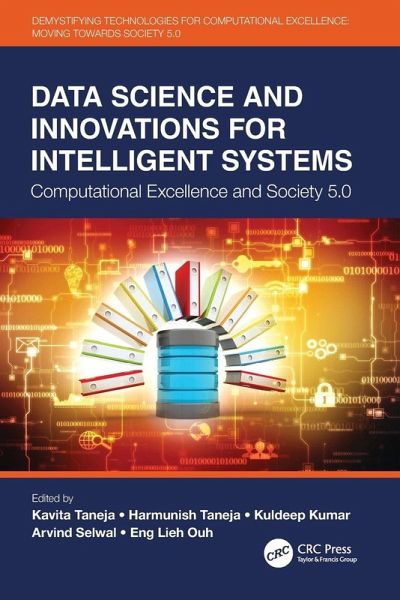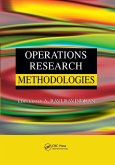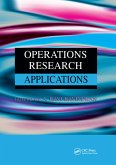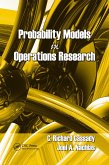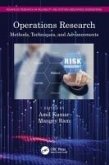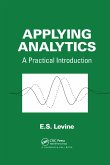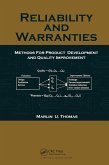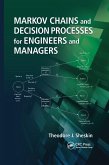Data Science and Innovations for Intelligent Systems
Computational Excellence and Society 5.0
Herausgeber: Taneja, Kavita; Ouh, Eng Lieh; Selwal, Arvind; Kumar, Kuldeep; Taneja, Harmunish
Data Science and Innovations for Intelligent Systems
Computational Excellence and Society 5.0
Herausgeber: Taneja, Kavita; Ouh, Eng Lieh; Selwal, Arvind; Kumar, Kuldeep; Taneja, Harmunish
- Broschiertes Buch
- Merkliste
- Auf die Merkliste
- Bewerten Bewerten
- Teilen
- Produkt teilen
- Produkterinnerung
- Produkterinnerung
This book not only focuses on the practical applications of data science to achieve computational excellence, but also digs deep into the issues and implications of intelligent systems.
Andere Kunden interessierten sich auch für
![Operations Research Methodologies Operations Research Methodologies]() Operations Research Methodologies94,99 €
Operations Research Methodologies94,99 €![Operations Research Applications Operations Research Applications]() Operations Research Applications94,99 €
Operations Research Applications94,99 €![Probability Models in Operations Research Probability Models in Operations Research]() C Richard CassadyProbability Models in Operations Research95,99 €
C Richard CassadyProbability Models in Operations Research95,99 €![Operations Research Operations Research]() Operations Research70,99 €
Operations Research70,99 €![Applying Analytics Applying Analytics]() E S LevineApplying Analytics94,99 €
E S LevineApplying Analytics94,99 €![Reliability and Warranties Reliability and Warranties]() Marlin U ThomasReliability and Warranties90,99 €
Marlin U ThomasReliability and Warranties90,99 €![Markov Chains and Decision Processes for Engineers and Managers Markov Chains and Decision Processes for Engineers and Managers]() Theodore J. SheskinMarkov Chains and Decision Processes for Engineers and Managers94,99 €
Theodore J. SheskinMarkov Chains and Decision Processes for Engineers and Managers94,99 €-
-
-
This book not only focuses on the practical applications of data science to achieve computational excellence, but also digs deep into the issues and implications of intelligent systems.
Hinweis: Dieser Artikel kann nur an eine deutsche Lieferadresse ausgeliefert werden.
Hinweis: Dieser Artikel kann nur an eine deutsche Lieferadresse ausgeliefert werden.
Produktdetails
- Produktdetails
- Verlag: CRC Press
- Seitenzahl: 366
- Erscheinungstermin: 4. Oktober 2024
- Englisch
- Abmessung: 234mm x 156mm x 20mm
- Gewicht: 540g
- ISBN-13: 9780367676285
- ISBN-10: 0367676281
- Artikelnr.: 71556905
- Herstellerkennzeichnung
- Produktsicherheitsverantwortliche/r
- Europaallee 1
- 36244 Bad Hersfeld
- gpsr@libri.de
- Verlag: CRC Press
- Seitenzahl: 366
- Erscheinungstermin: 4. Oktober 2024
- Englisch
- Abmessung: 234mm x 156mm x 20mm
- Gewicht: 540g
- ISBN-13: 9780367676285
- ISBN-10: 0367676281
- Artikelnr.: 71556905
- Herstellerkennzeichnung
- Produktsicherheitsverantwortliche/r
- Europaallee 1
- 36244 Bad Hersfeld
- gpsr@libri.de
Kavita Taneja is an Assistant Professor at Panjab University, Chandigarh. She obtained her Ph.D. in Computer Science and Applications from Kurukshetra University, Kurukshetra, India. She has published and presented over 60 papers in National/International Journals / Conferences and has bagged best paper awards in many Conferences including IEEE, Springer, Elsevier, ACM and many more. She is reviewer of many reputed Journals and has been Technical Program Committee member of many conferences. She has also authored and edited computer books. She has more than 18 years of teaching experience in various Technical institutions and Universities. She is also member of BoM, Academic Council and Board of Studies of many Universities and Institutions. She has guided scholars of Ph.D. / M.Phils., more than 100 PG students of various universities and currently 04 students are pursuing Ph.D. under her guidance at Panjab University. Her teaching and research activities include Mobile Ad hoc Networks, Simulation and Modelling and Wireless Communications. Harmunish Taneja is an Assistant Professor at DAV College, Sector 10, Panjab University, Chandigarh. He obtained his Ph.D. in Computer Science and Applications from Kurukshetra University, Kurukshetra. He is having more than 21 years of teaching and research experience. He has guided 05 M.Phil. students and more than 90 PG students of various universities. 04 students are pursuing Ph.D. under his guidance. He is reviewer of many reputed Journals and has been Review Committee member of many conferences. His research interests are Information Computing, Mobile Adhoc Networks, Image processing, Data Science, Recommender systems and System Simulation. He has published and presented over 55 papers in International Journals / Conferences of repute. He has also authored books of Computer Science and Applications. Kuldeep Kumar works at the Department of Computer Science and Engineering, National Institute of Technology Jalandhar, India. He received his PhD degree in Computer Science from the National University of Singapore in 2016. Prior to joining the institute, he worked for 2 years in the Birla Institute of Technology and Science, Pilani, India. He received his PhD in Computer Science from the School of Computing, National University of Singapore (NUS SoC), Singapore in 2016. He has several publications in reputed international journals/conferences. Arvind Selwal works as Assistant Professor in the Department of Computer Science and Information Technology, Central University of Jammu, India. His research interest includes machine learning, biometric security, digital image processing and soft computing. He has contributed more 25 research articles in reputed International Journals He has authored a book titled "Fundamentals of Automata Theory and Computation". He is an active member of Computer Society of India (CSI). He is undertaking two research projects from DRDO, New Delhi, India. Eng Lieh Ouh obtained his PhD in Computer Science (Software Engineering) from the National University of Singapore. He is involved in several large-scale information technology industry projects for a decade at IBM Singapore and Sun Microsystems before joining academia as an educator. His research areas are software reuse, software architecture design, design thinking and software analytics. He has experiences delivering courses for the postgraduate students, undergraduate students and industry participants in the software engineering areas including design thinking, practical software architecture design, security engineering and mobile development. He received multiple teaching excellence awards and industry projects recognition awards throughout his career.
1. Quantum Computing: Computational Excellence for Society 5.0 2.
Prediction Models for Accurate Data Analysis: Innovations in Data Science
3. Software Engineering Paradigm for Real-Time Accurate Decision Making for
Code Smell Prioritization 4. Evaluating Machine Learning Capabilities for
Predicting Joining Behavior of Freshmen Students Enrolled at Institutes of
Higher Education: Case Study from a Novel Problem Domain 5. Image
Processing for Knowledge Management and Effective Information Extraction
for Improved Cervical Cancer Diagnosis 6. Recreating Efficient Framework
for Resource Constrained Environment: HR Analytics and its Trends for
Society 5.0 7. Integration of Internet of Things (IoT) in Health Care
Industry: An Overview of Benefits, Challenges and Applications 8. Cloud,
Edge and Fog Computing: Trends and Case Studies 9. A Paradigm Shift for
Computational Excellence from Traditional Machine Learning to Modern Deep
Learning-Based Image Steganalysis 10. Feature Engineering for Presentation
Attack Detection in Face Recognition: A Paradigm Shift from Conventional to
Contemporary Data-Driven Approaches 11. Reconfigurable Binary Neural
Networks Hardware Accelerator for Accurate Data Analysis in Intelligent
Systems 12. Recommender System: Techniques for Better Decision Making for
Society 5.0 13. Implementation of Smart Irrigation System Using Intelligent
Systems and Machine Learning Approaches 14. Light-Weight Cryptography using
Trust Based System for Internet of Things (IoT) 15. Innovation in
Healthcare for Improved Pneumonia Diagnosis with Gradient-Weighted Class
Activation Map Visualization
Prediction Models for Accurate Data Analysis: Innovations in Data Science
3. Software Engineering Paradigm for Real-Time Accurate Decision Making for
Code Smell Prioritization 4. Evaluating Machine Learning Capabilities for
Predicting Joining Behavior of Freshmen Students Enrolled at Institutes of
Higher Education: Case Study from a Novel Problem Domain 5. Image
Processing for Knowledge Management and Effective Information Extraction
for Improved Cervical Cancer Diagnosis 6. Recreating Efficient Framework
for Resource Constrained Environment: HR Analytics and its Trends for
Society 5.0 7. Integration of Internet of Things (IoT) in Health Care
Industry: An Overview of Benefits, Challenges and Applications 8. Cloud,
Edge and Fog Computing: Trends and Case Studies 9. A Paradigm Shift for
Computational Excellence from Traditional Machine Learning to Modern Deep
Learning-Based Image Steganalysis 10. Feature Engineering for Presentation
Attack Detection in Face Recognition: A Paradigm Shift from Conventional to
Contemporary Data-Driven Approaches 11. Reconfigurable Binary Neural
Networks Hardware Accelerator for Accurate Data Analysis in Intelligent
Systems 12. Recommender System: Techniques for Better Decision Making for
Society 5.0 13. Implementation of Smart Irrigation System Using Intelligent
Systems and Machine Learning Approaches 14. Light-Weight Cryptography using
Trust Based System for Internet of Things (IoT) 15. Innovation in
Healthcare for Improved Pneumonia Diagnosis with Gradient-Weighted Class
Activation Map Visualization
1. Quantum Computing: Computational Excellence for Society 5.0 2.
Prediction Models for Accurate Data Analysis: Innovations in Data Science
3. Software Engineering Paradigm for Real-Time Accurate Decision Making for
Code Smell Prioritization 4. Evaluating Machine Learning Capabilities for
Predicting Joining Behavior of Freshmen Students Enrolled at Institutes of
Higher Education: Case Study from a Novel Problem Domain 5. Image
Processing for Knowledge Management and Effective Information Extraction
for Improved Cervical Cancer Diagnosis 6. Recreating Efficient Framework
for Resource Constrained Environment: HR Analytics and its Trends for
Society 5.0 7. Integration of Internet of Things (IoT) in Health Care
Industry: An Overview of Benefits, Challenges and Applications 8. Cloud,
Edge and Fog Computing: Trends and Case Studies 9. A Paradigm Shift for
Computational Excellence from Traditional Machine Learning to Modern Deep
Learning-Based Image Steganalysis 10. Feature Engineering for Presentation
Attack Detection in Face Recognition: A Paradigm Shift from Conventional to
Contemporary Data-Driven Approaches 11. Reconfigurable Binary Neural
Networks Hardware Accelerator for Accurate Data Analysis in Intelligent
Systems 12. Recommender System: Techniques for Better Decision Making for
Society 5.0 13. Implementation of Smart Irrigation System Using Intelligent
Systems and Machine Learning Approaches 14. Light-Weight Cryptography using
Trust Based System for Internet of Things (IoT) 15. Innovation in
Healthcare for Improved Pneumonia Diagnosis with Gradient-Weighted Class
Activation Map Visualization
Prediction Models for Accurate Data Analysis: Innovations in Data Science
3. Software Engineering Paradigm for Real-Time Accurate Decision Making for
Code Smell Prioritization 4. Evaluating Machine Learning Capabilities for
Predicting Joining Behavior of Freshmen Students Enrolled at Institutes of
Higher Education: Case Study from a Novel Problem Domain 5. Image
Processing for Knowledge Management and Effective Information Extraction
for Improved Cervical Cancer Diagnosis 6. Recreating Efficient Framework
for Resource Constrained Environment: HR Analytics and its Trends for
Society 5.0 7. Integration of Internet of Things (IoT) in Health Care
Industry: An Overview of Benefits, Challenges and Applications 8. Cloud,
Edge and Fog Computing: Trends and Case Studies 9. A Paradigm Shift for
Computational Excellence from Traditional Machine Learning to Modern Deep
Learning-Based Image Steganalysis 10. Feature Engineering for Presentation
Attack Detection in Face Recognition: A Paradigm Shift from Conventional to
Contemporary Data-Driven Approaches 11. Reconfigurable Binary Neural
Networks Hardware Accelerator for Accurate Data Analysis in Intelligent
Systems 12. Recommender System: Techniques for Better Decision Making for
Society 5.0 13. Implementation of Smart Irrigation System Using Intelligent
Systems and Machine Learning Approaches 14. Light-Weight Cryptography using
Trust Based System for Internet of Things (IoT) 15. Innovation in
Healthcare for Improved Pneumonia Diagnosis with Gradient-Weighted Class
Activation Map Visualization

